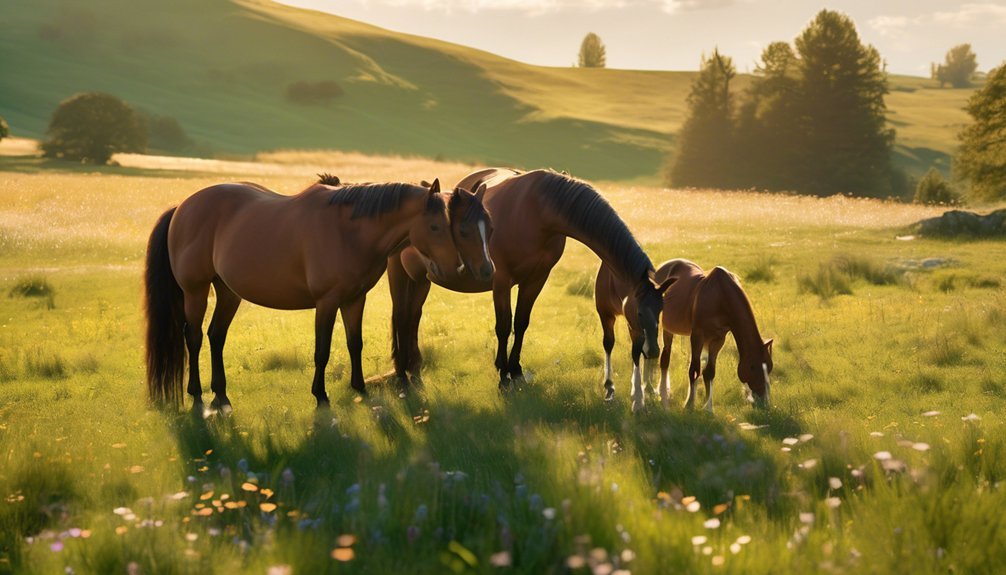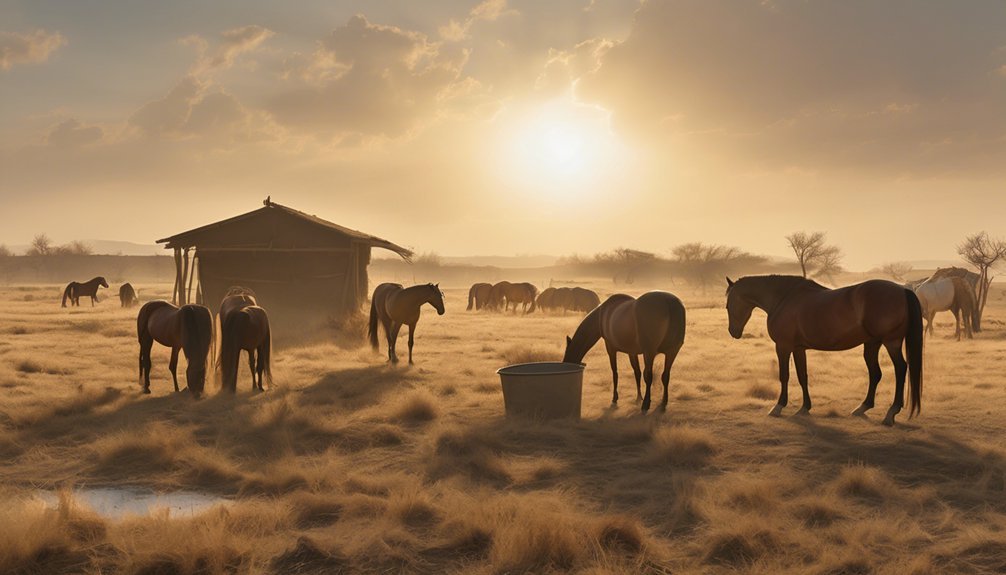
Horses are natural grazers, needing constant access to forage to maintain their health and well-being. Forage supports their digestive system, encourages healthy chewing, and stimulates saliva production, which is vital for preventing disorders like colic. Additionally, it plays a key role in weight management and promotes social interactions among herd members. Understanding the importance of forage can significantly impact your horse's overall health and happiness, but how can you effectively provide it?
Key Takeaways
- Horses require constant access to forage to support healthy digestive function and nutrient absorption through prolonged grazing.
- Continuous forage promotes a balanced gut microbiome, enhancing digestion and immunity while preventing digestive disorders like colic.
- Regular access to forage helps maintain ideal body weight by regulating appetite and preventing overeating.
- Providing constant forage mimics natural grazing behavior, reducing stress and promoting emotional well-being among horses.
- Ample forage access encourages social interactions and reduces stereotypical behaviors, fostering overall behavioral health in horses.
The Natural Grazing Behavior of Horses

When you observe horses in their natural habitat, you'll notice their instinctive grazing behavior plays a crucial role in their overall health and well-being.
These magnificent creatures exhibit unique grazing patterns, spending up to 16 hours a day foraging for grass and other vegetation. This constant grazing aligns with their natural instincts, promoting healthy digestive function and nutrient absorption.
They instinctively select varied forage, which ensures they receive a balanced diet rich in essential vitamins and minerals. By moving through their environment, horses also engage in social interactions, reinforcing bonds within the herd.
Understanding these natural grazing behaviors emphasizes the importance of providing your horse with constant access to forage, allowing them to thrive both physically and emotionally.
Digestive Health and Forage
Since horses have evolved to graze continuously, their digestive systems are finely tuned to process forage efficiently. When you provide constant access to forage, you support the production of digestive enzymes necessary for breaking down fibrous materials. This process aids in nutrient absorption and overall health.
Moreover, a diverse diet rich in forage promotes a healthy gut microbiome, which plays a crucial role in digestion and immunity. A balanced gut microbiome enhances fermentation, allowing your horse to extract maximum energy from feed.
When horses are deprived of forage, their digestive systems can struggle, leading to imbalances that may affect their health. By ensuring your horse has constant forage access, you foster a robust digestive system and a thriving gut microbiome.
The Role of Forage in Preventing Colic

Forage plays a critical role in preventing colic, a common and often serious digestive disorder in horses. By providing constant access to appropriate forage types, like grass hay or alfalfa, you promote healthy chewing and saliva production, which aids digestion.
This continuous intake helps maintain gut motility, reducing the risk of impaction and gas colic. Additionally, high-fiber forage encourages a balanced microbial population in the gut, essential for efficient digestion.
When horses have access to forage, they're less likely to experience the stress associated with long periods without food, further supporting colic prevention.
Prioritizing diverse forage types ensures your horse's digestive system stays robust, ultimately leading to a healthier, happier equine companion.
Weight Management and Forage Access
Maintaining a horse's ideal body weight can be challenging, especially when you consider their natural grazing habits and the energy content of their forage. Forage intake plays a crucial role in weight control, as it provides essential nutrients while satisfying their instinctual need to graze.
By allowing your horse constant access to forage, you help regulate their appetite and prevent overeating during meal times. This continuous grazing habit encourages a stable metabolism, reducing the risk of obesity or weight loss.
Additionally, selecting lower-calorie forage options can further assist in managing weight without compromising their health. Remember, a balanced approach to forage access not only supports weight control but also nurtures your bond with your horse, ensuring their overall well-being.
Behavioral Benefits of Continuous Forage

Offering your horse continuous access to forage significantly enhances their behavioral health and well-being. When your horse has constant forage, it mimics their natural grazing behavior, allowing them to engage in instinctual activities that reduce stress. This can lead to improved moods and decreased anxiety.
Additionally, forage access encourages social interaction among horses, as they often share grazing spaces, fostering bonds and reducing feelings of isolation. You'll notice that horses with ample forage tend to exhibit fewer stereotypical behaviors, such as cribbing or pacing, which are often signs of stress.
Nutritional Needs Met by Forage
Continuous access to forage can significantly meet your horse's nutritional needs, providing essential nutrients that support overall health.
Different forage types, including grass and legumes, offer a variety of vitamins, minerals, and fiber critical for digestion. This constant availability helps maintain a stable nutritional balance, which is vital for energy levels, weight management, and overall well-being.
Horses evolved to graze for hours, relying on a diet rich in roughage to promote gut health and prevent colic. By ensuring your horse has access to fresh, high-quality forage, you're not only satisfying their natural instincts but also delivering necessary nutrients that enhance their vitality.
This approach fosters a healthier, happier horse, allowing them to thrive in their environment.
Practical Ways to Provide Constant Forage

Since horses naturally graze throughout the day, providing constant access to forage can be achieved through several practical methods.
Here are some effective feeding strategies to consider:
- Slow Feeders: Use hay nets or slow feeders to mimic natural grazing and prolong forage availability.
- Pasture Management: Rotate pastures to ensure fresh grazing and prevent overgrazing, promoting healthier grass growth.
- Forage Alternatives: Incorporate safe forage alternatives, such as alfalfa or beet pulp, to add variety and nutritional balance.
- Hay Storage: Store hay in a clean, accessible area, ensuring it's always available when needed.
Implementing these strategies not only meets your horse's nutritional needs but also fosters a more natural and satisfying eating experience.
Frequently Asked Questions
Can Horses Eat Too Much Forage?
Yes, horses can eat too much forage, leading to overfeeding concerns. It's essential to establish forage limits based on their size, activity level, and health to maintain their well-being and prevent digestive issues.
What Types of Forage Are Best for Horses?
When choosing forage for your horse, consider grass varieties like timothy, Bermuda, and orchard grass. These options offer excellent nutritional benefits, providing essential fiber and promoting digestive health, ensuring your horse thrives in its environment.
How Does Forage Impact a Horse's Mood?
Forage can transform your horse's mood like magic! Providing constant access ensures mood stability, as the forage benefits promote natural behaviors, reducing stress and anxiety while enhancing emotional well-being. Happy horse, happy life!
Can Forage Help With Dental Health in Horses?
Forage benefits your horse's dental health by promoting natural chewing, which encourages even dental wear. This process helps prevent uneven teeth and potential dental issues, enhancing overall well-being and keeping your equine companion comfortable and happy.
Is Hay Better Than Pasture for Constant Forage?
When considering hay versus pasture, hay quality plays a crucial role. Well-managed pasture can provide better nutrients, but if poorly maintained, hay might be a more reliable option for consistent forage, ensuring your horse's health.
Conclusion
In conclusion, providing your horse with constant access to forage is as crucial as oxygen is to life. It supports their digestive health, prevents colic, and helps maintain a healthy weight while enhancing their emotional well-being through social interactions. By meeting their nutritional needs and promoting natural behaviors, you're not just feeding them; you're nurturing their very essence. Prioritizing forage access is essential for a thriving, happy horse, ensuring they live their best life.





